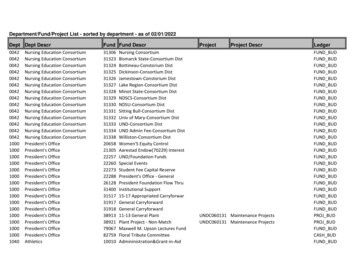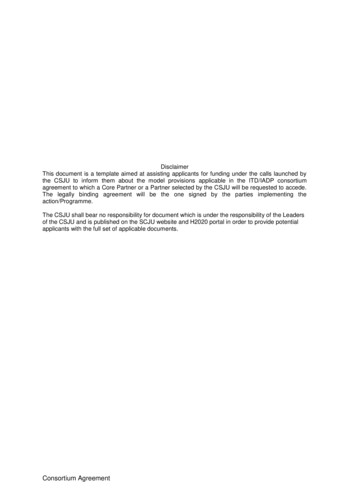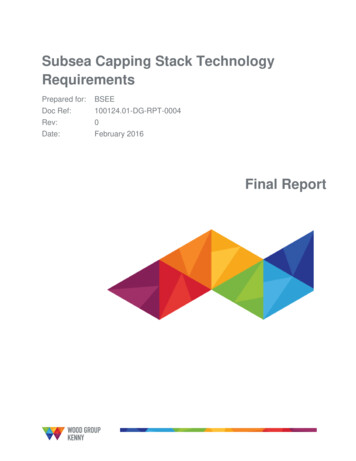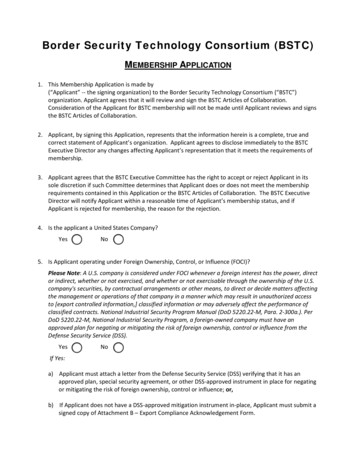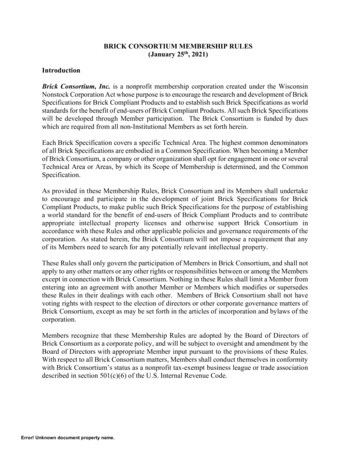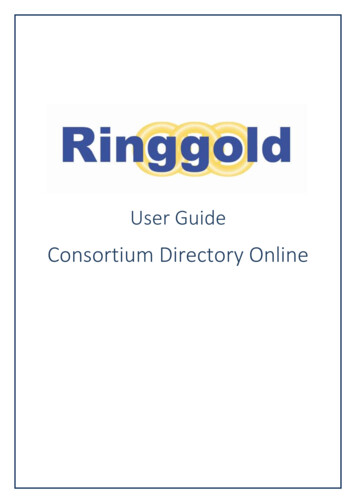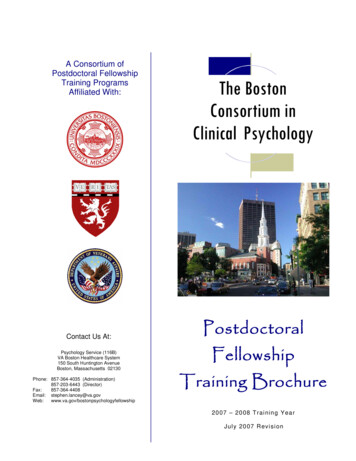
Transcription
A Consortium ofPostdoctoral FellowshipTraining ProgramsAffiliated With:The BostonConsortium inClinical PsychologyContact Us At:PostdoctoralPsychology Service (116B)VA Boston Healthcare System150 South Huntington AvenueBoston, Massachusetts 02130FellowshipPhone: 857-364-4035 (Administration)857-203-6443 (Director)Fax:857-364-4408Email: gyfellowshipTraining Brochure2 007 – 20 08 Tra in in g Y e arJuly 2007 RevisionPage 0
CORRECTIONSOn page 2:Jennifer J. Vasterling, Ph.D. replaces Dr. LoCastro. Dr. Vasterling is the Chief,Psychology Service and Chair, Executive Committee, Boston Consortium in ClinicalPsychologyChristine Quigley replaces Nga Pham. Ms. Quigley is the Management Analyst for theMental Health Service Line.On page 39:Phone numbers for the Office of Consultation and Accreditation have been added inaddition to those already listed for APA.CLARIFICATIONSOn page 39 under the heading “Providing Supervision”: The statement will be expanded in futureeditions of the Training Brochure to indicate that no less than four hours of supervision will beprovided fellows per 40 hour work week. No less than two hours shall be in individual, face-to-facesupervision with a licensed psychologist. The remaining two hours (minimum) may be eitherindividual, in group with no more than three trainees present, or a combination of the two.Also on page 39 under the heading “APA Accreditation”: The statement will be expanded to includeinformation that the Clinical Neuropsychology Training Program is accredited by APA as a specialtypractice area and that the Clinical Psychology Training Program is accredited by APA as a traditionalpractice area.
Training Brochure2007 – 2008WELCOMEAdministrationJoseph S. LoCastro, Ph.D.Chair, Executive Committee – Boston Consortium in Clinical PsychologyActing Chief, Psychology Service – VA Boston Healthcare SystemJamaica Plain Campus857 – 364 – 4041Sigmund Hough, Ph.D., ABPPDirector, Postdoctoral Fellowship Training ProgramWest Roxbury Campus857 – 203 – 6443Stephen R. Lancey, Ph.D.Director of Admissions and AccreditationJamaica Plain Campus857 – 364 – 5038Nga PhamAdministrative Officer for Mental HealthJamaica Plain Campus857 – 364 – 4039Page 1
Fellowship Training Program DirectorsAdministrative DirectorsProgram DirectorsGeropsychology FellowshipMichele Karel, Ph.D.Brockton Campus774 – 826 – 3725 GeropsychologyMichele Karel, Ph.D.Brockton Campus774 – 826 – 3725Clinical FellowshipsJoseph S. LoCastro, Ph.D.Jamaica Plain Campus857 – 364 – 4041 Clinical NeuropsychologyWilliam Milberg, Ph.D., ABPP/cnJamaica Plain Campus857 – 364 – 6205 Medical PsychologyDeAnna Mori, Ph.D.Jamaica Plain Campus857 – 364 – 4121 PTSD (Clinical Focus)Brett Litz, Ph.D.National Center for PTSDBehavioral Sciences DivisionJamaica Plain Campus857 – 364 – 4131Eve Davison, Ph.D.National Center for PTSDWomen’s Health Science DivisionJamaica Plain Campus857 – 364 – 4012 Rehabilitation PsychologySigmund Hough, Ph.D., ABPPWest Roxbury Campus857 – 203 – 6443 Substance Abuse TreatmentDeborah Brief, Ph.D.Jamaica Plain Campus857 – 364 – 4689Page 2
Table of ContentsIntroduction . 5Program Philosophy and Objectives . 5Philosophy and Mission StatementTraining ObjectivesModel of Training . 6Training Objectives - Competencies . 7Theories and Effective Methods of Psychological Assessment,Diagnosis, and InterventionsConsultation, Program Evaluation, Supervision, and/or TeachingStrategies of Scholarly InquiryOrganization, Management, and Administration Issues Pertinent toPsychological Service Delivery and Practice, Training, and ResearchProfessional Conduct; Ethics and Law; and Other Standards forProviders of Psychological ServicesIssues of Cultural and Individual DiversityOrganization of the Fellowship . 10Clinical TrainingResearch ActivitiesProfessional DevelopmentEducational OfferingsClinical Training Programs. 13GeropsychologyVA Clinical Fellowship Programs Clinical Neuropsychology Medical Psychology Posttraumatic Stress Disorder - Primary Clinical Focus Rehabilitation Psychology Substance Abuse TreatmentConsortium Administrative Structure . 30Consortium Executive Management CommitteeConsortium Executive CommitteeReview and Remediation Procedures . 32Evaluation MethodsDue Process PolicyTraining Environment . 32The Medical Centers and Outpatient ClinicsSupport ServicesResearch Activities . 34Living Environment . 35Page 3
Fellows, Hours, Stipend, and Benefits . 36Expectations of Fellows . 37Including: Knowledge of and Conformity to Relevant ProfessionalStandards, Acquisition of Appropriate Professional Skills, andAppropriate Management of Personal ConcernsResponsibilities of the Training Program . 38Including: Defining Professional Standards, Defining Evaluation Criteria,Providing Supervision, Providing Written Evaluations, Applying For APAAccreditationApplication Procedures. 40Training Faculty . 43Page 4
INTRODUCTIONDuring the 2007 - 2008 training year, the Consortium Postdoctoral FellowshipProgram anticipates it will provide training to nine full-time Fellows. September2006 represents the beginning of our thirteenth year of Geropsychologypostdoctoral training, and seventh year of postdoctoral training in the VA ClinicalPrograms in PTSD and Substance Abuse. For the 2006 – 2007 year, we weredelighted to announce the addition of two fellowship programs in RehabilitationPsychology and in Medical Psychology, and a renewed position in our long-standingClinical Neuropsychology Program.PHILOSOPHY AND MISSION STATEMENTThe overall goal of the Postdoctoral Fellowship Training Program of the BostonConsortium in Clinical Psychology is to produce independently functioning clinicalpsychologists. Our postdoctoral program’s model for training psychologists entailsfour broad, core components:(1) We work to identify, respect, and nurture the unique personalattributes that the Fellow brings to his or her work with patients,by providing an environment with support and guidance throughsupervision and collaboration with faculty actively working in thefield;(2) We encourage and model a scientist-practitioner approach toprofessional psychology, wherein empirically-informed knowledgeinforms psychological assessment and intervention with childrenand adults and wherein questions arising from clinical practicedrive research endeavors;(3) We provide a range of training settings and experiences that allowFellows to develop a breadth of expertise in psychological practice,as well as options for developing more specific interests in depth;(4) We provide training in multidisciplinary and interdisciplinary careenvironments in which the Fellow develops confidence as a localmental health expert who collaborates effectively with a range ofproviders in the context of a large medical care system.Page 5
MODEL OF TRAININGThe Postdoctoral Fellowship Training Program of the Boston Consortium in ClinicalPsychology is strongly committed to the scientist-practitioner model and respect forthe individual and diversity in the delivery of clinical care, clinical research, andprofessional teaching. We strive to provide Fellows with significant breadth anddepth of experience working with a variety of clinical populations whilesimultaneously applying an approach utilizing scientific information the inconceptualization, assessment, and treatment of these clinical problems. This goalis greatly facilitated by the rich and diverse clinical research setting offered by thetraining sites. The Consortium is home to numerous National Research Centers andCenters of Excellence, and with over thirty federally funded grants in the field ofMental Health and Substance Abuse. This wealth of research resources creates anatmosphere that embodies the scientist-practitioner model and infuses thefellowship training sites with a spirit of clinical empiricism that influences andguides both the staff and the fellows.Within this context, members of the training staff seek, and often achieve, abalance of scientist and practitioner in their professional lives which serves as aclinical-academic model for each fellow. For example, the majority of clinicalexperience offered to fellows in each training program is provided within a programof clinical research. As such, both our training setting, and training model provide arich context within which fellows are invited and encouraged to show clinical sciencemastery in a content area of their choice in preparation for competitive job searchesin academic, medical center, or clinical settings.We believe that teaching fellows in clinical service, scholarly thinking, and clinicalresearch design is best received and maintained within a junior colleague model oftraining. Our commitment to the fellows’ professional growth and scholasticdevelopment is conveyed in a supportive training atmosphere emphasizingindividual strengths. Fellows are challenged to think critically, and constructivecriticism is offered in a non-threatening manner to encourage the fellow’s fullcreative participation in all endeavors, both scientific and clinical.A guiding principle in all aspects of service delivery and clinical research within theprogram is respect and human dignity for our clients. We emphasize patients’rights, self-determination and the right to choose, including the patient’s right toadequate medical, psychological, educational, recreational and other communityservices, the patient’s right to family participation in treatment, and delivery of carewith the utmost privacy in the least restrictive environment. We honor cultural,ethnic, sexual orientation and gender differences in our patients and deliverservices accordingly.Finally, we tailor our training to be consistent with the current climate of clinicalpractice and research. As we prepare fellows for practicing psychology in the newmillennium, we are aware that fellows must be trained for delivery of brief,empirically defensible treatments with a broad spectrum of patients. The program’sdidactics, symposia, and seminars are utilized effectively towards this end to informPage 6
and support the current model of clinical practice. Similarly, as university, state,and federally funded health care organizations experience funding cutbacks anddownsizing, fellows are trained to recognize the value of seeking additional supportof clinical and research programs through local, state, and federal grant programs.Alternatively, as federal funding becomes more abundant, as in the current climate,Fellows are invited to collaborate on writing grants with program staff. Fellowshipoffers a window to the realities of clinical research and practice and we believe thatthe training that alerts fellows to these external economic, social, and politicalforces is important for a successful career.TRAINING OBJECTIVESThe postdoctoral training program is designed to be consistent with the AmericanPsychological Association’s guidelines for six general competency areas to beaddressed during Fellowship training. These training objectives provide the basisfor Fellows’ evaluation of their initial training needs and progress throughout theyear, as well as the supervisors’ evaluations of each Fellow’s progress. This generaloutline of learning objectives is adapted to the fellow’s particular learning goalsduring formulation of a training contract at the beginning of the Fellowship year.1.Theories and Effective Methods of Psychological Assessment, Diagnosis, andInterventionsA. Knowledge Areas Life span development (including cognitive, emotional, and socialprocesses) Biological and biomedical aspects Psychopathology Psychopharmacology Issues in assessment of children, adults, and older adults Issues in treatment of children, adults, and older adults Models of community coordination, prevention, education in mentalhealthB. Skill/Practice AreasAssessment: Clinical diagnostic interviewing, DSM, differential diagnosis Knowledge and use of psychological assessment devices (e.g., selfreport inventories) Knowledge, use, interpretation, and recommendations re:psychological and neuropsychological tests Functional assessment, medical and legal decision making,competency, child and elder abuse Appreciation of and collaboration in multidisciplinary assessmentPage 7
2.Treatment:Individual therapy (linking diagnosis, theory, intervention)Group therapy, psychoeducational groupFamily therapy, psychoeducation for family caregiversEstablishing rapport with patients; handling one’s own responsesSpecial applicationsCoordination of care with community-based providersConsultation, Program Evaluation, Supervision, and/or TeachingA. Knowledge Areas Models of multidisciplinary/interdisciplinary team functioning Methods for evaluating therapeutic and programmatic efficacy Models of supervision Issues in staff training and educationB. Skill/Practice Areas Interface with multidisciplinary team (constructive relationships,response to requests) Critical evaluation of therapeutic or programmatic effectiveness/unmetneeds Prepares for and directs individual supervision hour Provision of feedback to interns/externs Supervision of an intern/extern under supervision (optional and asavailable) Provision of staff training/education in didactic and clinical settings3. Strategies of Scholarly InquiryA. Knowledge Areas Theories and methods Preparing a research grant Writing a paper for publicationB. Skill Areas Application of the scientific literature to clinical, consultation, andteaching work Participation in or development of a research project4.Organization, Management, and Administration Issues Pertinent toPsychological Service Delivery and Practice, Training, and ResearchA. Knowledge Areas Administration of mental health programs Developing and sustaining health care programs in today’s fiscalrealitiesPage 8
B. Skill Areas Development of a clinical intervention (e.g., group) to address unmetclinical need Development of staff education (e.g., lecture) to address unmettraining need Committee participation (optional, e.g., various program committeesaddressing systemic changes)5.Professional Conduct; Ethics and Law; and Other Standards for Providers ofPsychological ServicesA. Knowledge Areas Professional Ethics (APA) and Federal/State Law Biomedical Ethics Ethical/Legal Issues in Psychology (e.g., informed consent,competency, guardianship) Professional Issues in Psychology (e.g., standards for practice)B. Skill Areas Response to and resolution of ethical problems in clinical settings Participation in policy/committee work related to legal/ethical issues(optional)6.Issues of Cultural and Individual Diversity that are Relevant to All of the AboveA. Knowledge Areas Sociocultural, ethnicity and socioeconomic factors Gender Differences Sexuality DifferencesB. Skill AreasUnderstanding, sensitivity, and working effectively among issues ofdifferences in: Culture/ethnicity/religion Gender and gender/sexual orientation issues Age/cohort Social environments and care systems Physical/Cognitive/Mental dysfunctionPage 9
ORGANIZATION OF THE FELLOWSHIPAll full-time Clinical Psychology Fellows are supported from September 1, 2007through August 31, 2008. The organization of the Fellowship provides Fellowsaccess to different populations and an opportunity to assume a variety of roles.The Fellowship includes clinical, research, and educational components, describedbelow. There is a fair degree of flexibility in how each Fellow might design theirtraining program with the Program Director’s approval, consistent with theirinterests and training needs. Further, the Fellows should benefit from opportunitiesfor collegial learning and collaboration.Clinical TrainingFellows are required to complete clinical activities in three core areas: assessment,intervention, and consultation. The distribution of time is determined by an initialneeds assessment and training contract process, integrating the Fellow’s traininginterests and needs.Research TrainingIt has been our experience that Fellows value and benefit from a scientistpractitioner training program which encourages skillful use of the empiricalliterature and opportunities for collaborative or self-directed research. However,Fellows differ in their level of motivation and interest to work on research duringthe Fellowship year. Therefore, the research requirement is flexible and designedto meet Fellows’ training needs, and may occupy 10% - 40% (i.e., ½ day to 2days) of the Fellow’s time; typically, research will occupy 20% time. To meet theresearch requirement, Fellows may: write up a paper based on prior work (e.g.,dissertation), collaborate with faculty on ongoing research, collaborate with facultyon a program evaluation project, or design and implement an independent researchproject under the mentoring of one faculty member. Fellows are encouraged topresent their work in a local, regional, and/or national educational setting, orsubmit work for publication as appropriate.Professional DevelopmentAll Fellows attend a monthly Postdoctoral Fellow Seminar (generally the secondThursday, 2:00 – 3:00 pm) for supportive professional development, chaired by theDirector of Postdoctoral Fellowship Training. Here, we develop a sense ofprofessional community and peer support during the Fellowship training year.Page 10
Educational OfferingsAll fellows attend a monthly Psychology Postdoctoral Fellowship Lecture Series(generally the second Thursday, 3:00 – 5:00 pm) chaired by the Director ofPostdoctoral Fellowship Training. Topics focus on issues pertaining to leadership,ethics, diversity and ethnicity, and professional identity. Below are examples ofseminars that have been included in the core curriculum during the 2004-2006training years: Leadership: Preparing For Leadership in Your Career during theFellowship Year: Presentation of Self, Self-Advocacy, Networking,Organizational Planning, and Life Enjoyment. Presenter: Sigmund Hough, Ph.D., ABPP Career Development: CV Development, Interviewing Skills andSecuring a Career. Presenter: Sigmund Hough, Ph.D., ABPP Ethics: Case Studies and Professional Decision Making. Presenter: Phillip M. Kleespies, Ph.D., ABPP Specialty Topic: The Individual, Not Just the Patient: A Returning IraqWar Veteran Shares Personal Insights. Presenter: Lance Corporal James P. Crosby, U.S.M.C. Ethics: Ethical Issues for Research and Practice in Geropsychology. Presenters: Michele Karel, Ph.D., and Jennifer Moye, Ph.D. Leadership in Psychology: The Role of Research Productivity. Presenter: Terence M. Keane, Ph.D. Career Development: The Ins and Outs of the Psychology LicenseProcess. Presenter: Elizabeth H. Nasser, Ph.D. Leadership/Politics: Massachusetts State House Field Trip. Presenter: State Representative Ruth B. Balser, Ph.D. Career Development: Corporate Consultation and Creating the Life YouWant as a Psychologist. Presenter: Harry Klebanoff, Ph.D., ABPP Diversity-Ethnicity: Increasing our Awareness. Presenter: Maxine L. Rawlins, Ph.D. Supervision: The Experience of Supervision: Multicultural Perspectives:A Process Discussion. Presenter: Rachel Levy-Bell, Psy.D.Page 11
Specialty Topic: Structural Equation Modeling. Presenter: Dawne Vogt, Ph.D. Assessment-Intervention/Neuropsychology: The Heart-BrainConnection. Presenter: William Milberg, Ph.D., ABPP/cn Mental Health Management and Research: Administration and GrantWriting. Presenter: Suzy Bird Gulliver, Ph.D. Diversity: Cultural Competency in Treating Native American Veterans:Implications for Approach to Treatment Including Collaborative Efforts. Presenter: Mose A. Herne, MPH, M.S. Diversity: Psychology’s Role in the Care of Adults Living with HIV. Presenter: Glenn R. Trezza, Ph.D. Diversity: Mental Health Believes in The Practice of Santeria. Presenter: Santeria Priest Steve Quintana Career Development: The EPPP/Licensure Process and Perspectives inCareer Direction. Presenters: Laura Grande, Ph.D. and Margaret M. Harvey, Psy.DIn addition to the core curriculum, each specialty area has developed trainingexperiences that are intended to focus on gaining knowledge and skills in the areaof specialization. These training experiences, listed below, include didacticseminars, colloquia, symposia, co-therapy, role modeling, observation, caseconferences, rounds, group supervision, and journal clubs. Also, Fellows across thedifferent specialty areas are given the opportunity to attend various seminarsconducted in other specialty areas. For example, the PTSD symposium is open toall staff and students in training. In addition, a number of the seminars conductedthrough the Predoctoral Internship Program are also available to the postdoctoralstudents. For example, the half-day symposium on Grant Writing is open to allstaff and students.Page 12
chele Karel, Ph.D.VA Psychology Service, 3-5-C940 Belmont StreetBrockton, MA 02301Telephone: (774) 826-3725Email: michele.karel@va.govLocationVA Boston Healthcare SystemBrockton, West Roxbury, and/or Jamaica Plain Campuses, dependingupon rotations selected.OverviewNumber ofFellowsLength ofTrainingGoalsThe program aims to train fellows for practice in the specialty area ofGeropsychology, that is, to become independently practicingpsychologists with expertise in assessment, intervention, consultation,and research with older adults, their families, and related caresystems. Geropsychology is an emerging specialty area withinprofessional psychology. Our program is designed to be consistentwith the American Psychological Association’s Guidelines forPsychological Practice with Older Adults and the Pikes Peak Modeldeveloped at the 2006 National Conference on Training in ProfessionalGeropsychology.Three full-time Fellows are admitted each year.One year.The goal of the Geropsychology Postdoctoral Fellowship program is toproduce independently functioning professional psychologists whoachieve a firm sense of competence in the majority of knowledge andskill competency areas deemed important for geropsychology practiceby experts in the field. The Geropsychology program embraces thefour core components of the Consortium’s postdoctoral training model(nurturing unique personal attributes of each Fellow; modeling ascientist-practitioner model of training; providing a range of trainingsettings to allow both breadth and depth of training; and encouragingFellows to develop confidence in collaborating and consulting withother disciplines in multidisciplinary and interdisciplinary careenvironments). Further, Geropsychology training emphasizes: thediversity of experience of older adults; the complex ethical dilemmasthat can arise in geriatric care; the importance of advocacy for clients’needs; and the consolidation of the Fellow’s professional identity as ageropsychologist.Page 13
Training objectives include development of clinical competencies in thefollowing areas: psychodiagnostic interviews and differential diagnosis with olderadults with complex medical, psychiatric, cognitive, and socialcomorbidities; neuropsychological evaluations and recommendations to teams; evaluations of decision making and other functional capacities; psychotherapy with older adults in individual, group, couple,and family modalities; collaboration and communication with multi- and interdisciplinary health care teams; collaboration with psychiatrists in psychopharmacologicalinterventions; consultation and staff education on psychological/behavioralissues; comprehension, application, and dissemination of clinicalgeropsychology research base; geropsychology program development, evaluation, and/orresearch.TeachingMethodsFellows develop advanced skills in professional Geropsychologythrough closely supervised and increasingly autonomous clinicalpractice across a continuum of geriatric care and in four core areas:assessment, intervention, consultation, and research.Clinical SettingsFellows design a program that includes clinical experience in three ofthe following five settings, working part-time in each rotation over thecourse of the entire year:(1) Nursing Home Care Unit: Based at the Brockton campus, the120-bed nursing home and 40-bed transitional care units servea broad mix of mostly elderly, medically frail, andpsychiatrically and/or cognitively impaired residents. TheFellow participates as a member of the treatment team for one40-bed unit, and provides assessment, therapy, consultation,and staff education services. Opportunities for specializedwork in palliative care are available.Clinical Supervisor: Jennifer Moye, Ph.D.(2) Geriatric Neuropsychology: Based at the Jamaica Plaincampus but serving all of VA Boston, the Geriatric Research,Education, and Clinical Center (GRECC) oversees a GeriatricConsultation Service and Neuropsychology ResearchLaboratory, among other programs. The Fellow contributes tointerdisciplinary outpatient geriatric assessments by providingPage 14
neuropsychological testing and relevant feedback andrecommendations to the team, veteran, and family.Clinical Supervisors: William Milberg, Ph.D., ABPP/cn, LauraGrande, Ph.D., and Betsy Leritz, Ph.D.(3) Acute Inpatient Geropsychiatry: Based at the Brocktoncampus, two acute inpatient psychiatry units serve manyveterans over the age of 60. Consulting to the interdisciplinaryteams on the two units, Fellows provide neuropsychologicalassessment, interviews to assess suicide and violence risk,evaluations focused on questions of decision-makingcompetency (e.g., re: safety to return home to independentliving or to make medical care decisions), as well as familyconsultations and short-term psychotherapeutic interventions.Clinical Supervisors: John Pepple, Ph.D., and BenjaminPresskreischer, Psy.D., ABPP(4) Geriatric Mental Health Outpatient Clinic: Based at theBrockton campus, this outpatient clinic provides assessment,psychotherapy (individual, group, family), case management,and psychopharmacology services to older veterans with awide range of medical and psychological/psychiatric difficulties.The Fellow provides intake evaluation and psychotherapyservices, often collaborating with primary care, social work,and psychiatry providers. Fellows may lead or co-leadpsychotherapy groups, including a family caregiver group.Clinical Supervisor: Michele Karel, Ph.D.(5) Geriatric Rehabilitation Psychology: Based at the WestRoxbury campus, the Psychology program currently servesolder veterans primarily referred from the Spinal CordInjury/Disorder Interdisciplinary Program, as well as thepotential for veterans referred from primary care medicine andthe outpatient mental health clinic. Collaborating with theSpinal Cord Injury healthcare team for both inpatient andoutpatient services, Fellows provide assessment, behavioralmedicine and other psychotherapy interventions (in group,individual, and family settings), and medical liaisonconsultation services for older veterans living with long-term ornewer onset disability.Clinical Supervisor: Sigmund Hough, Ph.D., ABPPThe amount of time spent weekly in each setting is determined by aninitial needs assessment and training contract process, integrating theFellow’s training interests and needs. Time on each rotation includesat least one hour of individual supervision weekly and, in the NursingPage 15
Home Care Unit rotation, an additional hour of group supervisionweekly. Facilities for videotaping clinical work are available.Research ExperienceIn addition to intensive clinical training, Fellows typically spend oneday per week devoted to research, writing, and/or programdevelopment activities. As part of the initial training contract, Fellowsdefine academic/research goals for the year and choose a facultyadvisor for these activities. To meet the research requirement,Fellows may: write up a paper based on prior work (e.g., dissertation),collaborate with faculty on ongoing research, collaborate with facultyon a program evaluation project, design and implement anindependent research project under the mentoring of one facultymember, write a grant proposal. Fellows are encouraged to presenttheir work in local, regional, and/or national educational settings, andto submit work for publication according to interest.There are a variety of ongoing research activities on which the fellowmay collaborate, including:(A) Decisional capacity evaluation in older adults: identifying keyneuropsychological and clinical markers of capacity losswithin diagnostic groups, improving performance-basedmeasurement of capacity, and translating this research intopractical tools for clinicians, attorneys, and judges.Dr. Jennifer Moye(B)Neuropsycholog
Psychology Service and Chair, Executive Committee, Boston Consortium in Clinical Psychology Christine Quigley replaces Nga Pham. Ms. Quigley is the Management Analyst for the Mental Health Service Line. On page 39: Phone numbers for the Office of Consultation and Accreditation have been added in addition to those already listed for APA.
